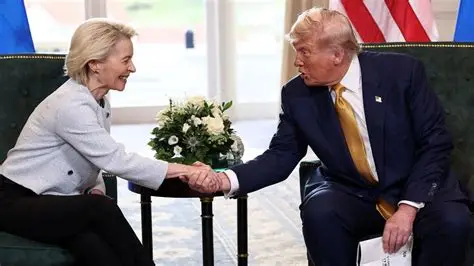

By Mantasha - Jul 28, 2025
The US-EU trade deal impacts various industries, with carmakers emerging as winners due to reduced tariffs. Consumers may see pros and cons, while the agreement affects European unity and global trade dynamics. This pivotal deal signals shifts in economic prospects for regions involved.

Presidents via <a target="_blank" href="https://www.dailyexpertnews.com/top-stories/us-eu-trade-deal-winners-losers-and-what-is-missing-who-benefits-and-which-new-deal-means-explained-today-news/">dailyexpertnews.com</a>
LATEST
The recent US-EU trade deal has sent ripples through various industries, shedding light on the winners and losers in this economic shift. With a primary focus on carmakers and consumers, the ramifications of the latest tariffs are steering the course for European solidarity as well. This pivotal agreement has the potential to reshape trade dynamics for both regions, prompting a closer examination of the outcomes.
In the aftermath of the trade deal, carmakers emerge as prominent figures on the winning side. With reduced tariffs and eased trade restrictions, automakers stand to benefit significantly, fostering a more competitive market environment. This development is poised to bolster the automotive industry, leading to enhanced growth prospects and increased market share for key players. The positive impact on carmakers signals a promising trajectory for the sector amid evolving trade landscapes.
From the consumer perspective, the trade deal translates into potential advantages and disadvantages. While reduced tariffs may result in lower prices for certain goods, other products could experience price hikes due to revised trade policies. This nuanced effect highlights the intricacies of trade agreements on consumer behavior and market dynamics. Furthermore, the deal's implications for European solidarity underscore the interconnectedness of economic decisions and regional cooperation, showcasing a blend of challenges and opportunities for stakeholders across the EU.
In a broader geopolitical context, the US-EU trade deal carries implications beyond individual sectors, influencing global trade dynamics and diplomatic relationships. Expert analysis suggests that the agreement could pave the way for deeper economic integration between the US and EU, while also impacting trade flows with other regions. As the dust settles on this transformative agreement, the focus shifts towards future economic implications, risks, and opportunities that lie ahead for businesses, consumers, and policymakers navigating the evolving landscape of international trade.